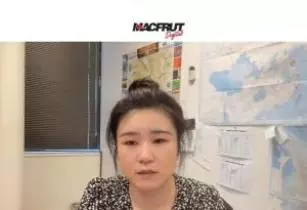Chinese imports of Italian fruit and vegetables rose by 74% in the first six months of 2020, although last year there was a 20% increase
It is also true, however, that Italy accounts for 1% of China’s exports. These numbers emerged from the China-Europe debate on the second day of Macfrut Digital on 9 September.
Renzo Piraccini, president of Macfrut, opened the Forum and talked about a “New Silk Road” for the fruit and vegetable sector. “We have set ourselves the goal of creating a logistics hub in Northeast Italy for Chinese agri-food products intended for the European market and turn the platform into a hub for exporting fruits and vegetables to China. It is a great opportunity, and we must seize it if we are to further expand this fruit and vegetable market since 86% of products are intended for Europe. Adequate infrastructure is essential to achieve internationalisation,” Piraccini added.
The numbers presented by Gianpaolo Bruno, director of ICE-Agenzia China - Italian Foreign Trade Agency, support Piraccini’s idea. “The Chinese market is very vast and diverse. The numbers are impressive: last year, 195mn tonnes of fruits and 200mn tonnes of horticultural products were produced in China. China’s imports are on the rise and are now at US$1bn, with Italy up by 20% with US$26mn in 2019,” Bruno said.
“The Italy-China balance of trade is still in favour of China (+US$105mn); however, we are catching up. As of today, kiwis (96% of the entire market), oranges, lemons, hazelnuts and preserves can be exported to China. We are working towards signing new protocols to expand the range of products that we can export,” Bruno added.
Ma Hongtao, general manager of the Agricultural Trade Promotion Centre (ATPC), the promotional body of the Chinese Ministry of Agriculture and Rural Affairs, also focused on the theme of the Silk Road. “China and Italy have a long-standing history of trade. We have a new mission: to rebuild a new, modern Silk Road as a bridge to connect two distant countries, Europe and China, and the fruit and vegetable sector is a great start to this process,” Hongtao noted.
Paolo De Castro, the vice-chairman of the European Parliament Committee on Agriculture and Rural Development, talked about the importance of Italy-China relations. “The Committee on Agriculture and Rural Development is currently working on expanding relations with China and all of Southeast Asia. With regard to relations with China, it is also crucial to bring food safety regulations in line to ensure that Chinese products intended for our consumers have the same standards as European products for the Chinese market. More dialogue with China means more opportunities for Italian companies.”
Several Chinese producers took the floor to highlight the basic features of their businesses and their products: Elvis Lai - a lychee producer, Xixi Li -a fresh pear producer, Anna Zhang, Yang Zong - a tomato paste producer, and Aries - a lemon producer.
Subsequently, a round table was held, moderated by Luigi Bianchi of Cesena Fiera, with Pino Calcagni, president of the Besana Group, Andrea Raggi, Canova’s export manager, and Francesco Zanoni, Delfanti’s export manager, attended by three Chinese industry professionals.





